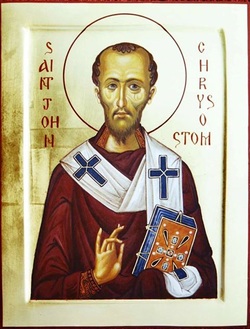John Chrysostom, AD 347-407

I will go to my father...
. . . For as the best physicians bring back those who are far gone in sickness with careful treatment to a state of health, not only treating them according to the laws of the medical art, but sometimes also giving them gratification: even so God conducts to virtue those who are much depraved, not with great severity, but gently and gradually, and supporting them on every side, so that the separation may not become greater, nor the error more prolonged.
And the same truth is implied in the parable of the prodigal son as well as in this. For he also was no stranger, but a son, and a brother of the child who had been well pleasing to the father, and he plunged into no ordinary vice, but went to the very extremity, so to say, of evil, he the rich and free and well-bred son being reduced to a more miserable condition than that of household slaves, strangers, and hirelings. Nevertheless he returned again to his original condition, and had his former honour restored to him.
But if he had despaired of his life, and, dejected by what had befallen him, had remained in the foreign land, he would not have obtained what he did obtain, but would have been consumed with hunger, and so have undergone the most pitiable death: but since he repented, and did not despair, he was restored, even after such great corruption, to the same splendour as before, and was arrayed in the most beautiful robe, and enjoyed greater honours than his brother who had not fallen. For "these many years," saith he "do I serve thee, neither transgressed I thy commandment at any time, and yet thou never gavest me a kid, that I might make merry with my friends; but when this thy son is come who hath devoured thy living with harlots, thou hast killed for him the fatted calf." So great is the power of repentance.
Having then such great examples, let us not continue in evil, nor despair of reconciliation, but let us say also ourselves "I will go to my Father," and let us draw nigh to God. For He Himself never turns away from us, but it is we who put ourselves far off: for "I am a God" we read "at hand and not a God afar off." And again, when He was rebuking them by the mouth of this prophet He said "Do not your sins separate between you and me?" Inasmuch then as this is the cause which puts us far from God, let us remove this obnoxious barrier, which prevents any near approach being made.
*John Chrysostom (AD 347-407) was a great theologian, preacher, and leader of the early church in Antioch and Constantinople. This selection is from Exhortation to Theodore after His Fall: Letter 1 (4th Century)
Some questions to consider:
1) "No ordinary vice": How does John characterize the plight of the younger son in the far country?
2) "The same splendor as before": What does John mean when he writes that the younger son "returned to his original condition"?
3) "Great is the power of repentance": How does John describe the younger son's repentance as an act of his will?
4) "Having then such great examples": What practical application to the lives of his readers does John make?
5) "I am a God at hand": What understanding of the nature of God does John derive from the parable?
